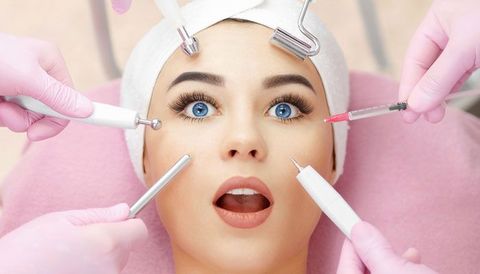The ultimate Guide skincare routine for glowing skin
A skincare routine is a set of steps designed to care for the skin and maintain its overall health. It exists because the skin is exposed daily to environmental factors such as sunlight, pollution, changing weather, and lifestyle habits. Over time, these factors can affect the skin’s texture, clarity, and hydration.
Skincare routines typically include cleansing, moisturizing, and protecting the skin. They help remove impurities, support the skin barrier, and maintain hydration. As skincare research grows, routines have become more personalized, allowing people to choose methods that suit their skin type, climate, and concerns.

Importance
A consistent skincare routine matters today more than ever due to environmental changes, increased screen time, and rising awareness of skin health. It is relevant for people of all ages and skin types. A good routine helps address issues such as dryness, sensitivity, dullness, uneven tone, and breakouts.
Key reasons skincare routines are important include:
-
Skin barrier support: Protects against external irritants and moisture loss.
-
Preventive care: Reduces the impact of environmental stress before it becomes visible.
-
Confidence and comfort: Healthy skin improves comfort and contributes to overall well-being.
-
Adaptation to modern lifestyles: Indoor environments, air conditioning, and blue-light exposure influence skin behavior.
By solving daily skin challenges, routines contribute to long-term skin stability and overall appearance.
Recent Updates
Skincare trends and research have continued to evolve during 2024–2025, influenced by scientific studies, consumer behavior, and technological developments. Some notable updates include:
-
Barrier-focused routines (2024): There is increased emphasis on repairing and strengthening the skin barrier through minimal, gentle steps.
-
Dermatologist-backed ingredients (2024): Ingredients like niacinamide, peptides, and ceramides continue gaining popularity for their multi-benefit properties.
-
Blue-light and pollution protection (2025): Rising screen time has influenced interest in ingredients that support skin exposed to digital devices and urban conditions.
-
Microbiome research (2024–2025): Studies now highlight how maintaining healthy skin bacteria can enhance overall skin balance.
-
Tech-based skincare tools (2025): Apps, skin scanners, and AI-based routine planners are becoming common for personalizing routines.
As skincare becomes more science-driven, routines are shifting from complex steps to simplified, effective practices.
Laws or Policies
Skincare routines are influenced by regulations related to product safety, ingredient labeling, and consumer protection. While these rules vary across countries, several common guidelines affect how skincare information is delivered and how products reach consumers.
Examples include:
-
FDA (United States): Sets guidelines for ingredient safety, labeling accuracy, and claims that skincare brands can make.
-
EU Cosmetic Regulation (Europe): Requires safety assessments, transparent ingredient listings, and strict criteria for allergens.
-
Health Canada: Monitors cosmetic formulations and ensures compliance with national health standards.
-
Global SPF regulations: Many countries regulate how sun protection factors are tested and labeled due to their importance in skin health.
-
Environmental programs: Some regions now encourage eco-friendly packaging and responsible ingredient sourcing.
These policies ensure that skincare routines are built around safe, regulated products with accurate information.
Tools and Resources
Several tools and resources support people in creating or maintaining a skincare routine. These include digital tools, educational platforms, and skin analysis aids.
Useful resources include:
-
Skin analysis apps: Tools that evaluate skin hydration, pores, and texture using mobile cameras.
-
Routine planner apps: Platforms that help build step-by-step routines based on skin type and lifestyle.
-
Ingredient databases: Websites that explain common skincare ingredients and their functions.
-
Dermatology organizations: Provide educational articles on skin health, sun protection, and daily care.
-
Online hydration calculators: Help track water intake, which indirectly affects skin appearance.
These tools make skincare more accessible and easier to understand, especially for beginners.
FAQs
What are the basic steps of a skincare routine?
The basic routine includes cleansing, moisturizing, and sun protection. Additional steps, such as exfoliation or treatments, may be added based on skin needs.
Is a morning routine different from a night routine?
Yes. Morning routines usually focus on protection, especially sunscreen. Night routines focus on repair and hydration due to the skin’s natural recovery process.
How can someone identify their skin type?
Skin type can be evaluated by observing how the skin feels throughout the day. Common types include dry, oily, combination, normal, and sensitive. Skin analysis tools or dermatology websites can also help.
How often should someone exfoliate?
Most people exfoliate one to three times per week depending on skin sensitivity. Over-exfoliation can weaken the skin barrier, so moderation is important.
Does diet affect glowing skin?
Diet, hydration, sleep, and stress levels all influence skin behavior. Balanced nutrition supports healthier-looking skin, although it is not a replacement for topical care.
Conclusion
A skincare routine is a simple and effective way to support glowing, healthy-looking skin. By understanding context, importance, and current trends, individuals can create routines that match their needs without unnecessary complexity.
Recent advancements show a shift toward gentle, science-backed practices that focus on long-term skin balance rather than quick fixes. Regulations and educational tools further ensure that skincare routines remain safe and informed.
Disclaimer: The information provided in this article is for informational purposes only. We do not make any claims or guarantees regarding the accuracy, reliability, or completeness of the information presented. The content is not intended as professional advice and should not be relied upon as such. Readers are encouraged to conduct their own research and consult with appropriate professionals before making any decisions based on the information provided in this article.






